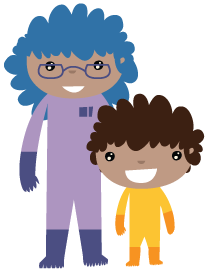

Responding to Your Child's Feelings
Tip 1
Name Their Feelings
When your child is having “big feelings,” you can help them name the feeling. You can ask questions to help understand the feelings. Show them you are excited they shared their feelings so they will continue to share with you.
Open Resources
Featured Activity:
Name That Feeling
Kids have lots of feelings, but they may not know it is okay to have them. It helps to let them know it’s okay to have feelings and help them manage them. For example, you can say, “You must be feeling mad because we are leaving the park…” Then let them know it is okay to be mad sometimes.
Tip 2
Listen and Repeat
Your child may or may not be talking yet. For those who aren’t talking, pay attention and say out loud what you think they may feel. For kids who are talking and use words, listen closely to them and show that you respect their wants and thoughts.
Open Resources
Featured Activity:
Repeat Repeat Repeat
If your child is excited, listen to what they tell you and repeat back what they said to show that you are listening and understand. For example, you hear them say, “Truck, truck!!!” and you say, “Yes, I see a big, yellow truck!”
Tip 3
Comfort your Child
When your child is having “big feelings,” show that you care. Touching, holding, comforting, rocking, or singing helps your child know they are special and loved. Comforting a child when they are upset lets them know it’s ok to show feelings.
Open Resources
Featured Activity:
Soothe Singing
Sometimes your child is so worked up that they seem out of control. A good way to bring them back to a “good place” is by singing a favorite song and inviting them to sing along, dance, or snuggle with you.
Tip 4
Safe Space
After a child has told you their feelings, take time to let them know it’s ok to have those feelings. Ask if there is anything else they want to tell you.
Open Resources
Featured Activity:
Support Space
When your child is upset, think about providing “space” to calm them down, maybe a hug, or a kiss. Let them know you love them no matter what.
Tip 5
Don’t Jump to Fix the Problem
As parents, we hate to see our kids upset. Our reaction is to fix it and get them feeling happy again. Emotions are a part of life, so it’s important to let them know that all emotions are okay.
Open Resources
Featured Activity:
Smell the Roses
Support your child in calming down. Ask them to take a deep breath when they are having “big feelings.” Tell your child to pretend they are smelling a flower and then pretend to blow out birthday candles to help them calm down. They may still feel upset, but it may not be so overwhelming.
Resources
Helpful Links for Stellar Parents!



